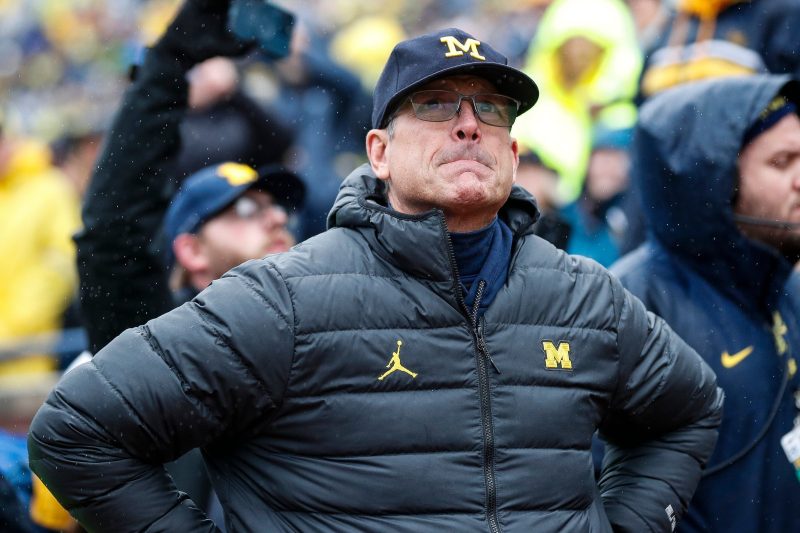
Really? The CFP committee is just going to ignore Michigan scandal?
There will probably be complaints coming out of Michigan this week thanks to the College Football Playoff selection committee, which ranked the Wolverines No. 3 despite being the most dominant team in the sport on a week-in, week-out basis this season.
They should probably thank the committee for considering them at all.
If Tuesday’s rankings tell us anything, it’s that the Michigan sign-stealing scandal — for better or worse — isn’t going to be part of the CFP committee’s calculus.
“Our job as we look at it is to rank the teams to follow our protocols,” NC State athletics director Boo Corrigan, who chairs the committee, said on ESPN. “And as we went through, that really wasn’t part of any of the discussions that occurred in our time together. It’s an NCAA issue, it’s not a CFP issue.”
Fair enough. The CFP’s job is to determine the four best teams in the country, not litigate every detail that has emerged regarding what suspended Michigan staffer Connor Stalions was doing when he apparently sent buddies to stadiums all over the country to film future Michigan opponents in an attempt to decipher signals.
But there’s one problem here: As this scandal unfolds in real time, doesn’t the CFP committee have a responsibility to at least try and figure out whether Michigan is beating opponents by an average of 35 points per game because it cheated in a way that gave the Wolverines a real, tangible advantage?
Over the years, the selection committee has accounted for all kinds of odd factors in ranking teams because its job isn’t just to look at data but to understand what it’s looking at and why. Several years ago, you even had former committee chair Jeff Long parsing a Stanford loss at Northwestern because the game kicked off at 9 a.m. Pacific time. Yes, they actually discussed body clocks.
Is that kind of granular discussion necessary to figure out the four best teams in the country in a given year? Probably not. But part of what gives the committee its self-appointed gravitas is the notion that it goes through every detail and looks at every factor that causes a team to win or lose.
And we’re supposed to believe that a major cheating scandal hanging over the head of a playoff contender should just be ignored?
During a conference call with the media, which Corrigan led by saying the committee was “impressed with how (Michigan) dominated their opponents,’ I asked what seems like a pretty obvious question during all of this. How can a committee properly determine that Michigan is the third-best team in the country if they didn’t even discuss whether part of their dominance was using information they obtained by breaking rules?
At that point, CFP executive director Bill Hancock stepped in and provided what was surely a well-planned answer: “Michigan has played well all season. Fact of the matter is, no one knows what happened. We are dealing right now with allegations only. The committee makes its judgments based on what happened on the field, and clearly Michigan has been a dominant team.”
After 10 years of listening to the language of the CFP, what he’s saying is clear. The committee just isn’t going to get involved in this story in any way, shape or form. And given that the NCAA is unlikely to finish any kind of substantive investigation before the end of this season, it means Michigan’s only real obstacles for making the playoff are probably Penn State and Ohio State.
“You have to remember that these are allegations at this point and not facts,’ Hancock said in response to a second question about Michigan. “So there’s no substantive evidence that anything happened that might have affected the game. All the committee does is evaluate what happens on the field during games, and that’s why we are where we are.”
But this isn’t your typical NCAA scandal like we saw in the old days, when a player might get suspended because he got paid to sign some autographs. As comical as the Stalions story is in so many ways, nobody who understands or works in football could possibly deny that the alleged extent of his sign-stealing operation was designed expressly to give Michigan the information edge over its opponents.
If that information was obtained through means that are outside the NCAA rulebook — and sending spies to film sidelines would indeed be a blatant violation — it’s completely fair to question whether Michigan is as good as the margins it has been putting up.
And that just … didn’t come up in the room at all? Hard to believe and even harder to endorse as an operational principle for a group of people that is supposed to be digging deeper than the final scores.
If there’s any encouraging news in all of this, it’s that we know Michigan’s sign-stealing operation is over. Stalions is suspended, and if the allegations are proven, unlikely to ever work in college football again. The Wolverines, who haven’t played anyone with a pulse yet, are going to have to face Penn State and Ohio State without Stalions’ help.
If Michigan wins those games, it will be in the playoff without asterisks or caveats. If it doesn’t, a lot of things about the Wolverines’ success the last couple of years will start to look fishy in retrospect.
And after Tuesday, it’s now all abundantly clear. No matter how embarrassing this story gets, no matter how many details come to the surface as the next few weeks unfold, the CFP committee is going to take a pass on holding Michigan to account.
